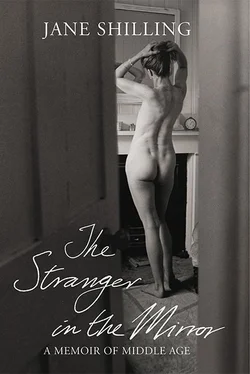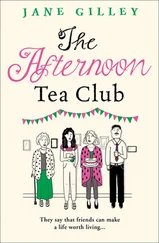‘The trouble is,’ says my friend Prudence, as we discuss our awkward age, ‘that you’ve been giving a performance all your life, but when you become middle-aged, suddenly you don’t know who the performance is for any longer. When you’re a child it’s your parents and your teachers. Then it’s your mates at school and college; then, when you’re starting an independent life, it’s lovers and work colleagues. Then suddenly you’re middle-aged, and who is the performance for now? It has to be for yourself.’ And it’s true. One’s personal drama doesn’t stop just because the house isn’t as packed as it once was.
Simone de Beauvoir, writing at the age of 54 in her memoir, Force of Circumstance , described with memorable bitterness the sensation of life closing in, the dwindling of horizons that came with the passing of youth. Often, she wrote, she dreamed that she was dreaming. In her dream-within-a-dream, she would imagine that she was 54. Then, in her dream, she would wake with relief to find that it wasn’t true, that she was only 30, before realising, while still asleep, the crushing truth that her joy at finding herself not old was illusory.
Everything, she wrote, was infected by the ‘pox of time’, even her sense of connection with the world. ‘Never again shall I collapse… into the smell of hay. Never again shall I slide down through the solitary morning snows. Never again a man… In spite of everything, it’s strange not to be a body any more…’ Even the richness of memory has deserted her – the books she read, the places she visited, the music she heard: ‘They made no honey, those things… [no] nourishment.’
Ten years later, another volume of memoir, and the landscape has altered again. The convulsion of change is over: ‘As I see it, there is not much difference between being 63 and 53, whereas when I was 53 I felt at a staggering distance from 43.’ The scandal of ageing, the sense of being excluded by the world – spurned by the very snowflakes and hayfields – has receded. The affronted feeling of being betrayed by her own memories is assuaged. Now, ‘What strikes me is the way the little girl of three lived on, grown calmer, in the child of ten, that child in the young woman of twenty, and so forward… Through all my changes I still see myself.’
Hovering on the threshold of the changes that older women describe with such misgiving, I find myself gripped both with a silly conviction that it won’t happen to me (even though it already is). But also by the longing for some directions to this difficult terrain. The ones I have consulted so far seem somehow faulty. Trying to find a way by them feels like trying to navigate a city centre with a guidebook published in a previous century. The major landmarks are just distinguishable, but all the thoroughfares have shifted; the places of interest have changed; I cannot recognise my journey as the one charted by the people who travelled before me, even quite recently.
In the end, I get out the photographs of myself from a baby onwards and spread them out on the table. There aren’t many of them: just a handful from my childhood, teens and twenties; and although a mass of pictures begins once my son is born, it’s almost always me behind the camera, so I am mostly absent from those.
But between the absences there are just enough fixed points to map a life: a newborn baby with pop eyes, clenched fists and an inexplicable shock of wild black hair; a bandy-legged toddler peering suspiciously at a daffodil; a beaming five-year-old in the first class of infant school and then a series of passport photographs: sombre at 11 in crooked, swooping-framed glasses at least fifty years too old for me; grimly disaffected six years later as I prepared to leave home in a hurry; mousy and formless at 25; all in black with dark lipstick a year later, like a newspaper photograph of a nineteenth-century French lady poisoner.
After that a gap of almost ten years, and then a mixed clutch of a dozen tender pictures with my son taken over a decade and the same number of pictures taken in various guises for work: a pretty picture byline taken when I was so much in love that the glow of it quite effaced the fearful hangover from which I was suffering; pictures of me cooking, shopping for groceries, on horseback at a meet of hounds, before-and-after Botox shots of me looking pale and furious (even beneath the drag-queen’s slap of the ‘after’ picture).
Two of the photographs – the first two, of the smiling five-year-old and grave, bespectacled 11-year-old – make me sad; it seems to me that I can see between the two pictures the shutting down of whole areas of personality which wouldn’t come to life again for decades – not until I had a child of my own. Like de Beauvoir I can see the child of five in all her later metamorphoses: the sullen teenager, the formless twentysomething whose life had taken a wrong turning, the new mother, the middle-aged woman. But although I can’t help wondering what might have become of that child if her circumstances had been only a little different, I haven’t quite de Beauvoir’s sense of having been cheated.
What failures and disappointments befell the girl I was – at any rate the 17-year-old I was – were mostly my own work. And after all, if you’d asked the five-year-old what she wanted when she grew up, three of the most urgent items on her list of ambitions (to write, to have a baby and a horse of my own) have been realised.
Fate saw to it that I discovered fairly early the unreliability of some of the bigger deceptions that life dangles in front of women – the ones to do with thinking that everything will be all right, that you’ll be taken care of, that love solves everything. But it strikes me that the biggest lie of all has been saved up until now, and it’s the one I could still fall for, because one is so vulnerable, so soft and shell-less at this moment of change that it requires every bit of self-control not to believe that some alchemy, some cocktail of hormones, surgery, diet, cosmetics and positive thinking can stop time and keep me poised for ever just at the moment before I grow old.
It is well known that one of the baleful symptoms of female middle age – along with hot flushes, sudden weight gain, incapacitating vagueness, wrinkles, invisibility, powerlessness and an interest in gardening – is not having a thing to wear. Sure enough, as I arrived at 50, without warning my clothes seemed to turn against me.
I might have sensed the problem earlier if I hadn’t resigned from my last office job at 40 and begun to work from home, which I mostly did in a utilitarian uniform of jeans and cardigans. Working at home, and the extra homeboundness of single parenthood, meant that I hardly ever had to assume a public face. It was not until almost a decade later, when I began to attend a weekly ideas meeting at a newspaper office, that I realised something had gone wrong.
I was a voracious reader of fashion magazines, so I’d kept my eye in – or so I thought. I had cupboards crammed with the sartorial love affairs of the past decades – a journal of my adult life in chiffon, leather and wool. And although time had softened and slackened the flesh on my bones, a metabolism-boosting temperament of high anxiety meant that the zips and buttons of my old garments still fastened willingly enough. So at first, when I started to dress for the office, I did it with the unaccustomed pleasure of getting ready for an occasion.
I’d leave the house convinced that I looked tremendous: elegant, original, with a fascinating vintage twist. But during the journey from Greenwich to London a curious transformation would take place. Looking at the other people on the bus and train, my confidence in what I was wearing would begin to seep away, and by the time I reached the office, full of busy, efficient young women, all looking indefinably right in their clothes, it would be clear to me that what I had on was, equally indefinably, wrong . Not risibly unfashionable or disastrous mutton dressed as lamb, just very dowdy and a bit eccentric. I could see myself through the eyes of the confident young women in their neat, tight officewear and teetering high heels: an opinionated old bird in flat boots, trailing peculiar bits of vintage finery.
Читать дальше












